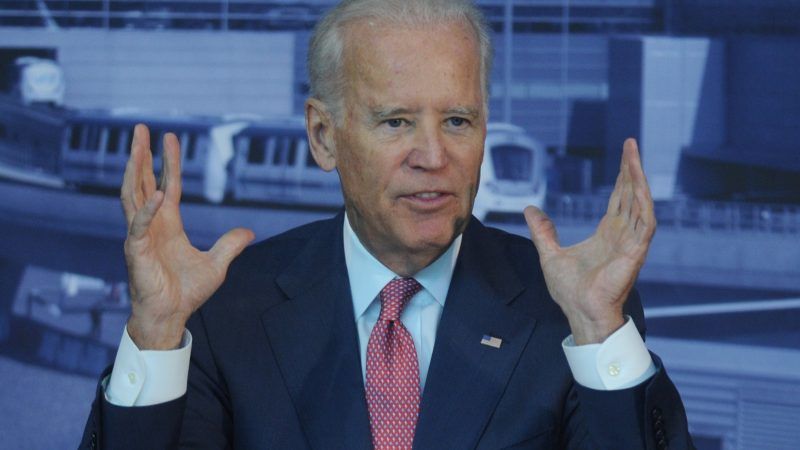Joe Biden Plans To Ban and Register 'Assault Weapons' but Won't Say What They Are
The presidential contender says the 1994 ban made mass shootings less lethal, even though the guns it tolerated were "just as deadly."

Former Vice President Joe Biden claims the 1994 federal ban on "assault weapons," which expired in 2004, "reduced the lethality of mass shootings." Yet the Democratic presidential contender simultaneously concedes that the 1994 law, which was part of a broader crime bill that he sponsored, had no impact on the lethality of legal firearms, which remained "just as deadly."
In a gun control plan he unveiled today, Biden promises to fix that problem with new legislation that will "prevent manufacturers from circumventing the law by making minor changes that don't limit the weapon's lethality." Since such laws have always been based on arbitrary distinctions that have little or nothing to do with a gun's capacity to kill people, it is hard to see how he can possibly keep that promise.
Under the 1994 ban, removing "military-style" features such as folding stocks, flash suppressors, or bayonet mounts transformed forbidden "assault weapons" into legal firearms, even though the compliant models fired the same ammunition at the same rate with the same muzzle velocity as the ones targeted by the law. That is also true of the new, supposedly improved "assault weapon" ban sponsored by Sen. Dianne Feinstein (D–Calif.), who wrote the 1994 law. Feinstein has fiddled with the list of military-style features (omitting bayonet mounts while adding barrel shrouds, for instance), and any one of them would now be sufficient to make a rifle illegal, whereas two were required under the 1994 ban. But the problem identified by Biden remains: Removing these forbidden features results in a gun that is "just as deadly."
Biden's plan does not specify how he would improve on Feinstein's approach. "Federal law prevents hunters from hunting migratory game birds with more than three shells in their shotgun," he says. "That means our federal law does more to protect ducks than children."
Does Biden plan to ban all guns that are capable of firing more than three rounds without reloading? If so, his ban would extend far beyond the firearms covered by any existing or proposed "assault weapon" law. Such a ban also would be clearly unconstitutional, applying to all semi-automatic firearms and revolvers, including the handguns that the Supreme Court has said are covered by the Second Amendment.
Presumably that is not what Biden has in mind, and his duck hunting example is just a red herring. But by refusing to say what he means by "assault weapons," a category that means whatever legislators say it means, he makes it impossible to take his proposal seriously.
In addition to banning "assault weapons" (whatever that means), Biden wants to give current owners of such undefined firearms a choice: They can either sell their guns to the federal government or register them under the National Firearms Act, as is currently required for machine guns, suppressors, and rifles and shotguns with barrels shorter than 18 inches. "Due to these requirements," Biden says, "such weapons are rarely used in crimes."
Yet that is also true of "assault weapons," whether under the 1994 definition or the new one proposed by Feinstein. Last year, according to FBI numbers released this week, rifles in general—only a subset of which would qualify as "assault weapons"—accounted for 4 percent of guns used in firearm homicides where the type of weapon was specified. Handguns, by contrast, accounted for 93 percent of the guns used in those cases.
Unlike his rival Beto O'Rourke, Biden does not plan to confiscate "assault weapons." But his registration scheme faces the same formidable obstacle: The federal government does not know who owns which guns. State attempts to register "assault weapons" have met with embarrassingly little success, and there is no reason to think a federal requirement would inspire broader compliance, especially now that talk of confiscation is in the air.
Biden, in short, claims the 1994 "assault weapon" ban made mass shootings less lethal even though the weapons that remained legal were "just as deadly"; that the legislation he has in mind will fix that problem, although he cannot say how; and that the federal government can succeed in registering "assault weapons," however he chooses to define them, even though the track record of such efforts provides little reason to believe that's true. And he implies that all of this will somehow have a noticeable impact on firearm homicides, which are almost never committed with the guns he wants to target. As a policy proposal, his plan does not pass the laugh test, but it beautifully illustrates the magical thinking of gun controllers.



Show Comments (112)